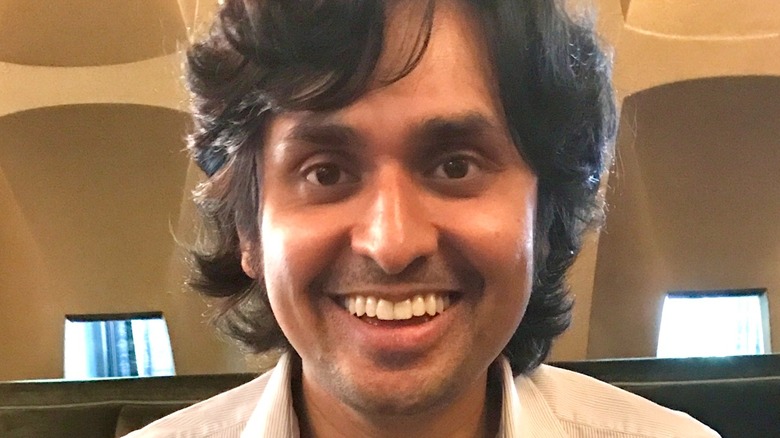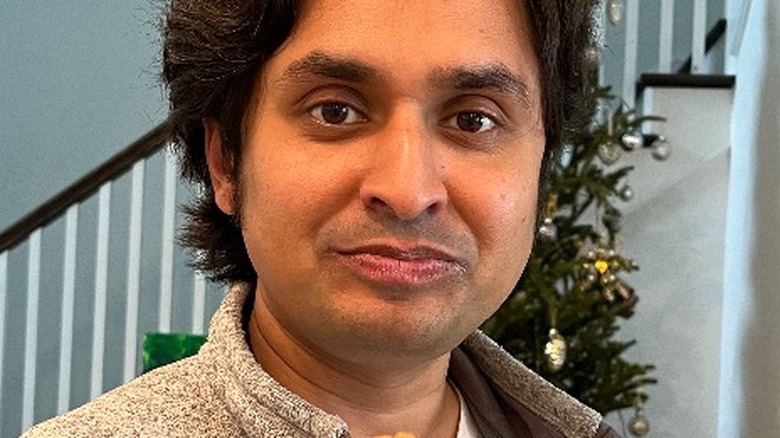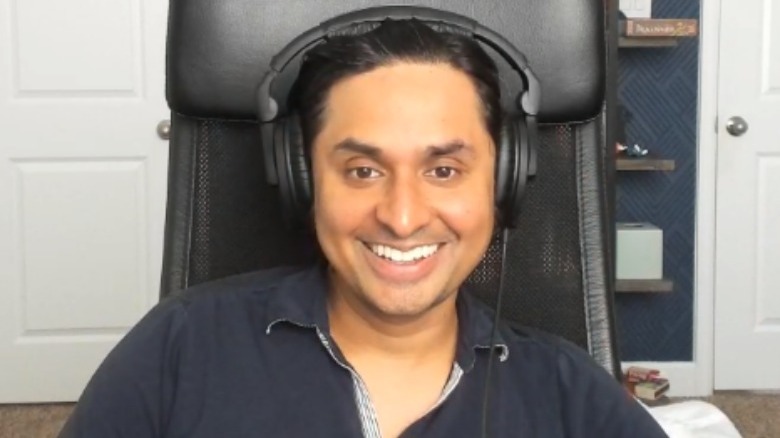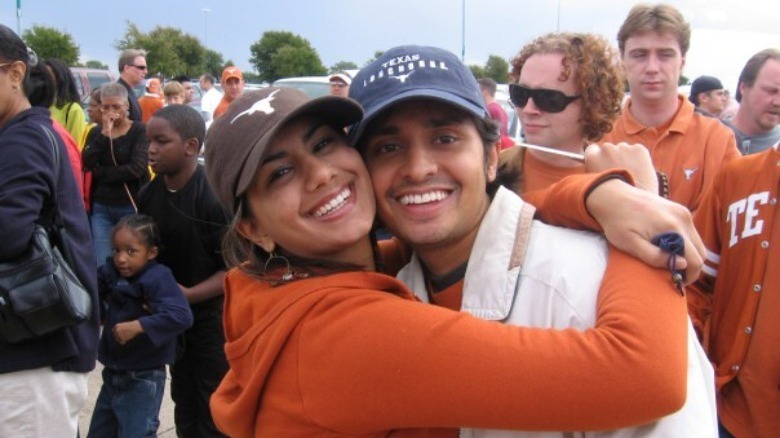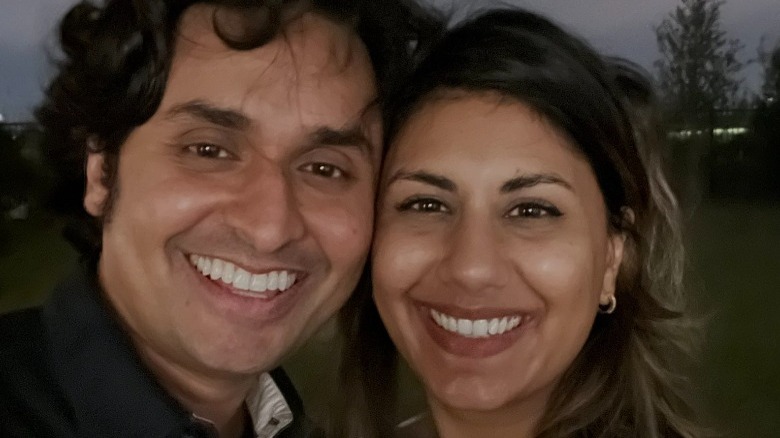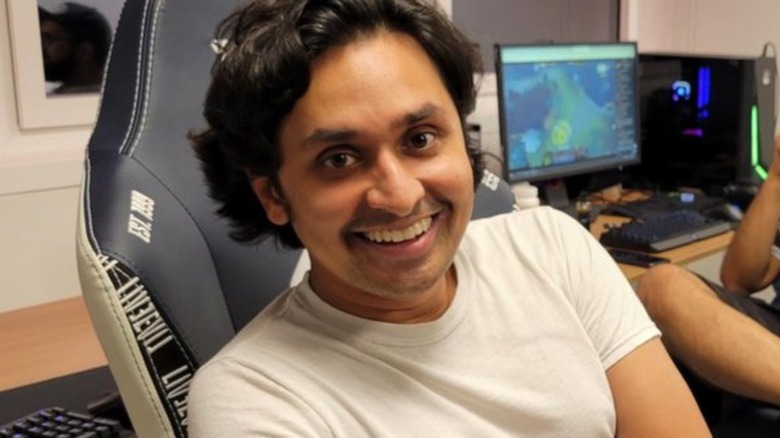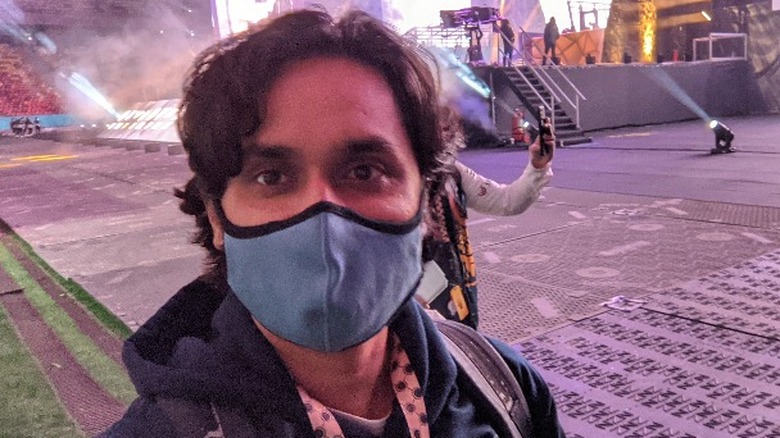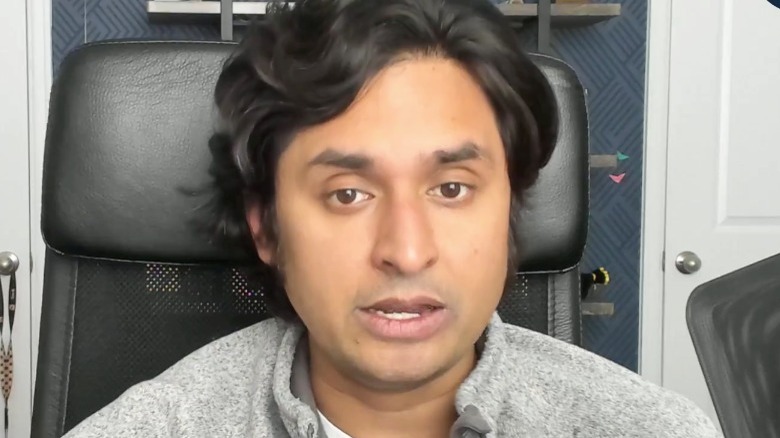The Untold Truth Of Dr. K
Streaming comes with its own unique flavor of mental health challenges. In the past, major streamers like Pokimane have shared some surprisingly toxic messages received from fans, and Asmongold has discussed quitting because being a streamer is "not fun" a lot of the time. Even Amouranth — who has dominated Twitch with her controversial ASMR streams — has considered quitting because at times the profession just doesn't seem worth it. Sharing one's life with the world comes with the risk of affecting a streamers' mental health, often making them feel lonely and isolated, despite their thousands of followers.
That's where Dr. Alok Kanojia comes in. Known as Dr. K online, Kanojia works to address issues of mental health in the gaming space, specifically with streamers. While many gaming fans have seen Dr. K's talks with popular streamers on his HealthyGamerGG channel, they might not know much about the man behind the coaching service. As it turns out, Dr. K feels so passionately about gamers and gaming because he's also part of the community he works so hard to protect. Here's the untold truth of Dr. K.
Dr. K started also struggled with gaming addiction
HealthyGamer didn't materialize overnight, and the idea didn't suddenly come to Dr. K on a whim. Instead, he began studying video game addiction as a psychology student because of his own struggles with putting down the controller. In an article about game addiction from MIT Technology Review, Dr. K was featured as one example of how games can take over the lives of all sorts of people, including serious academics. Dr. K said that as an undergrad he could feel his future "slipping away" as he stayed up most nights to play video games, only quitting when he was absolutely exhausted.
Dr. K said he knew he wanted to be a doctor of some sort, but couldn't stop playing games instead of studying for classes. After trying to make things work for an extended period of time, Dr. K had to leave the program at the University of Texas in Austin. Something had to change, and the only solution was leaving the source of his addiction. Although he couldn't have known at the time, Kanojia's decision to leave school would shape his future path.
He studied meditation and yoga in India
Importantly, Dr. K knew he had a problem with video game addiction. In a stream on HealthyGamer, he said, "When I'm skipping all my classes for a week and playing 'Diablo,' I know there's a problem." After seeing his grades slip and prioritizing video games above all else, Dr. K knew he needed a massive reset in order to realign his focus. So he left the country.
According to MIT Technology Review, Kanojia spent six years (beginning in 2003) moving back and forth between the US and India each summer, studying meditation and yoga in its country of origin at an ashram. CNN elaborated that his father recommended the trip as a quick retreat, but something about the practice stuck with Kanojia. He began to see meditation and yoga as useful tools for structuring his life. For a time, Kanojia even wanted to study to become a monk. However, Kanojia ultimately decided to pursue his original plan of studying medicine, settling on psychology as his area of expertise.
He rose from the ashes to go to Harvard
When he flunked out of undergrad, Dr. K didn't necessarily anticipate returning to complete his schooling at Harvard, but that's exactly what he did. After taking some time off to study meditation in India, Kanojia finished his education and found himself ready to match into a residency program for med school.
Kanojia set his goals high, applying and ultimately getting into Harvard's residency program. HealthyGamerGG looked back on the moment to encourage future doctors on their own match day, reminding hopeful students that anything can happen. Dr. K wears his medical training as a badge of honor, especially after rising from the ashes of a 2.5 GPA to attend a well-regarded residency program. In fact, many promotional tweets and materials from HealthyGamerGG mention Dr. K's Harvard residency and expertise as a selling point for the program.
Kanojia eventually ended up working at Harvard as an instructor, though he ultimately left in order to work on HealthyGamerGG. In one stream, he explained that people often "define success as an external personal goal." By all outside perceptions, working at Harvard is a major life achievement, but that didn't mean it made Dr. K happy. Instead, he channeled his love of gaming into a new sort of practice.
Dr. K is still a gamer -- but less so now that he has a family
Even though he once battled a gaming addiction — and even though he's now a father, husband, and full-time leader of HealthyGamerGG — Dr. K still finds a healthy amount of time to game.
In a Reddit AMA, he said, "I still game now, when I can find time. Since I have two young kids, have a job, and do a lot of stuff for Healthy Gamer, I tend to play Switch and sometimes PC gaming." He stated that the problem some gamers have isn't the fault of games themselves, but the addiction that can occur when those gamers don't have a healthy balance between playing and the rest of their lives. Luckily, Dr. K has a family that works to keep him from gaming too much.
Dr. K met his wife at a summer camp where they were both counselors. He explained that he originally didn't think women would like him, so he pretended to be someone else in order to impress them. When Dr. K began studying to become a monk, he stopped worrying about impressing women and dating, and that's when love struck. Kanojia married his wife Kruti after his first year of medical college and the two now have a family together.
In addition to being beautiful and charming, Kruti shares her husband's passion for helping gamers, and works with him on HealthyGamerGG.
He approaches psychiatry from both a mental and physical perspective
Importantly, Dr. K uses his training in meditation and yoga to help others through his psychiatry practice. On his professional psychiatry site (which uses different branding from HealthyGamerGG), Dr. K listed an explanation of how he views psychiatry and how he intends to practice. He noted that he wants to approach psychiatric care holistically, taking into consideration the mind and body, instead of just the mind.
While psychiatry naturally considers the body to some degree — especially considering that psychiatrists have to complete a medical residency — Dr. K seeks to integrate strategies like meditation in his patients' care plans. His site explains that he "combines the latest research with ancient practices to bring his patients the benefits of multiple bodies of knowledge to tangibly cultivate mental resilience."
Kanojia uses Ayurvedic practices — a system of natural medicine used in India for thousands of years — in combination with contemporary medical science in order to treat his patients privately, but he also suggests meditation to his HealthyGamerGG clients. Dr. K advocates for meditation for gamers because it helps improve focus and forces the practitioner to sit with their thoughts and feelings, instead of avoiding them via distractions like video games. This means that when players do get to sit down for a gaming session, they can appreciate it even more.
He's got famous friends
During his time working on HealthyGamer, Dr. K has talked to a variety of high profile streamers, attempting to get to the root of their deepest insecurities. And through his gentle demeanor and thorough questioning, Dr. K has gotten streamers to admit some tragic details.
For example, LilyPichu said that her mother once wished she'd never been born. Even worse, she told her daughter how she felt, leading to LilyPichu having a difficult relationship with her parents during her adolescence. Because HealthyGamer interviews are meant to be just that — interviews — Dr. K shared some of his own personal experiences to make LilyPichu feel less alone. He noted that he also grew up with strict parents, and the two laughed at their similar experiences. Because HealthyGamer streams are not traditional therapy sessions, Dr. K is able to reveal more of his personality as he talks with clients to highlight mental health struggles. His experiences often help inform a session, and serve to put the interviewee more at ease.
Dr. K has talked with Pokimane, xQc, penguinz0, Scarra, Asmongold, and many more, bringing his brand to a wider audience and getting his message across to more people. His interviews help viewers better understand that streamers are just normal people, and they also have their own insecurities and downfalls.
Not everyone likes Dr. K
Despite his large following and famous friends, not everyone is a fan of Dr. K.
A quick search on Reddit uncovers many threads dedicated to hating him, in fact. A few even claim that his interviews with popular streamers undermine his ultimate goal of destigmatizing mental health. One Redditor constructed a lengthy post outlining why Dr. K's methods might be dangerous, calling him a "charlatan." The poster argued that Dr. K "draws extensive conclusions about his patient's psychological development based on marginal information" and uses pseudoscientific methods to help clients.
Others were quick to agree that some aspects of Dr. K's work with HealthyGamer are problematic. One commenter said that Dr. K does sometimes jump to conclusions about a client's mental health based on limited information, citing an interview with Reckful as an example. Others pointed out that what Dr. K does online isn't technically therapy, and therefore those discussions shouldn't be compared to the larger practice of psychiatry and should instead be seen as conversations. One commenter simply said Dr. K seems like the "Dr. Phil of Twitch."
He's interested in helping more than just popular streamers
HealthyGamer seeks to talk to a wide group of people, and doesn't bill itself as only being concerned with famous streamers and internet celebs. In addition to creating a number of videos with ordinary gamers, Dr. K has also prioritized highlighting other social issues on HealthyGamer. While some of these issues relate to video games — like an interview with a mom who hates video games — others relate to political and social issues outside of the gaming space.
For example, Dr. K sat down with vocal Trump supporters to hear about their views on politics. Throughout the interview, Dr. K demonstrates patience and active listening, making sure everyone felt respected, despite their differing viewpoints.
Dr. K also once interviewed a self-proclaimed "incel" seeking to begin a new relationship. In that interview, the interviewee, Paul, explained, "Honestly, airing your dirty laundry in front of a live audience, as a nobody, is quite a daunting thing." Even though Paul felt initially nervous, Dr. K worked to validate his nervousness and help him understand his own feelings. Listening to others and attempting to understand the variety of human experiences is a key aspect of both Dr. K's approach to interviews and HealthyGamer as a whole.
In addition to interviews, Dr. K also provides instructional content. From a lecture on sex education for gamers to a discussion of how religion can affect one's mental health, HealthyGamer has a little bit of something for everyone.

